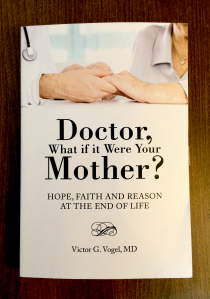
Over the last several months I’ve reviewed a number of books dealing with death and dying in the context of our medical system. (Atul Gawande’s, Being Mortal; Rob Moll’s, The Art of Dying – for example.) This marks the final review in that series.
I recently read “Doctor, What If It Were Your Mother? Hope, Faith and Reason at the End of Life.” The book was written by Victor Vogel, MD, a board-certified medical oncologist caring for women with breast cancer, with 30 years of clinical research in oncology. He has served as the National Vice President for Research for the American Cancer Society, and was Professor of Medicine and Epidemiology at the University of Pittsburgh School of Medicine. Interestingly, and this has bearing on the book, Dr. Vogel is also an ordained Presbyterian elder and a Pittsburgh Theological Seminary board member.
In the introduction to his book, Dr. Vogel laments the fact that many dying patients “have been conditioned to believe that hope only comes through the use of therapeutic interventions (such as surgery, medical devices, medication, and procedures) and not from spiritual reflection and wrestling with life’s most deep and profound questions.” I would add that this belief resides in families, not just patients. It is often the families who are pushing for interventions. (p. XII) This perspective (intervention versus spiritual reflection) sets the tone for rest of the text.
Later on in his text, Dr. Vogel points out that we are a nation of people who demand action. Doing nothing is not tolerated. “There has to be something we can do.” We want action. We want interventions. We want heroics. We want to fight death to the bitter end. It’s not just the clinicians who want to save the day; it is often the patients and the family members who have to believe there is a solution out there. And there appears to be an overall lack of communication about what is best for the patient’s quality of life.
Dr. Vogel’s book seems well suited for people of faith who are grappling with issues of death and dying. He gives examples and instructs his readers on ways to address important spiritual needs of dying patients through utilizing better doctor/patient/family communication. Through his text, he strives to empower patients to make informed and rational decisions that help to ensure they receive the most compassionate and effective care, and encourages them to ask for palliative care when appropriate.
Dr. Vogel also raises in the mind of his reader a question about when therapeutic interventions have run their course. The most important element seems to be an open dialogue between the physician and the patient. How best can we improve the quality of life of this individual during their final months, weeks or days?
I am happy to say that his concludes my series of book reviews on death and dying. I’m ready to move on to other interests within healthcare and healthcare marketing!
